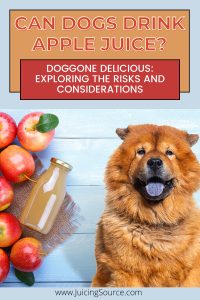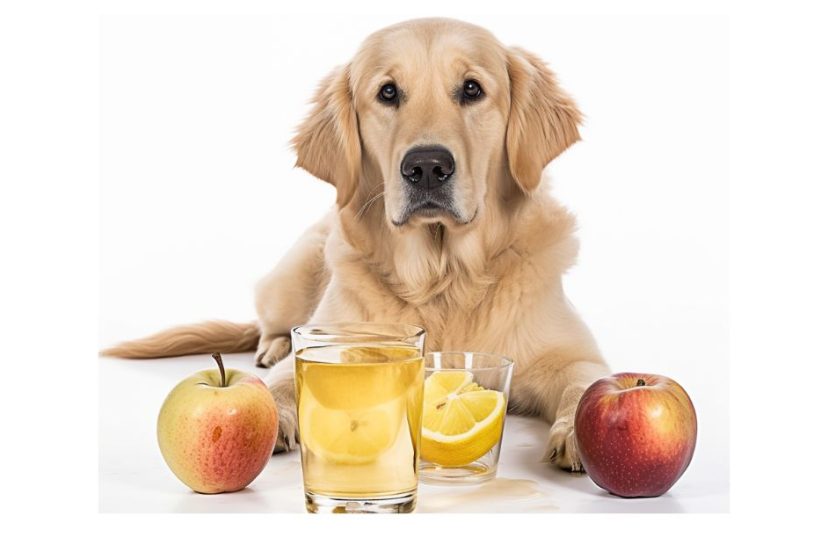Can Dogs Drink Apple Juice? Doggone Delicious: – Exploring the Risks and Considerations
I am always seeking ways to improve the well-being of our furry companions. Juicing has gained popularity in recent years for its numerous health benefits. In this article, I will delve into the topic of whether dogs can drink apple juice, the potential health benefits of apple juice for dogs, and important considerations to keep in mind before offering it to your canine companion.
The Health Benefits of Apple Juice for Dogs:
Apple juice, when given in moderation and under appropriate circumstances, can offer certain health benefits to dogs. It contains essential vitamins, minerals, and antioxidants that can support their overall health. However, it is important to note that apple juice should not replace a balanced diet and should only be considered as an occasional treat.
Can Dogs Drink Apple Juice?
Yes, dogs can drink apple juice, but there are a few important factors to consider. It is crucial to provide only pure, unsweetened apple juice without any additives or artificial sweeteners. The juice should also be diluted with water to reduce the sugar content and prevent digestive issues.
Things to Consider Before Giving Apple Juice to Dogs:
- Digestive Sensitivity: Some dogs have sensitive stomachs and may experience digestive upset when introduced to new foods or beverages. Monitor your dog’s reaction to apple juice and discontinue if any adverse symptoms occur.
- Underlying Health Conditions: Dogs with certain health conditions, such as diabetes or pancreatitis, may need to avoid sugary foods and beverages like apple juice. Consult with your veterinarian before introducing apple juice to your dog’s diet.
- Allergies: Although rare, some dogs may be allergic to apples. Watch for any signs of allergic reactions, such as itching, rashes, or gastrointestinal distress, and seek veterinary advice if necessary.
Homemade Apple Juice for Dogs:
If you decide to offer apple juice to your dog, it is best to make it at home to ensure its purity and freshness. Follow these simple steps to prepare homemade apple juice for your furry friend:
- Choose Fresh Apples: Select ripe, organic apples free from pesticides or other harmful chemicals.
- Wash and Core the Apples: Thoroughly wash the apples to remove any dirt or residue. Remove the core and seeds, as they contain substances that are harmful to dogs.
- Juice the Apples: Use a juicer or blender to extract the juice from the apples. If using a blender, strain the juice through a fine-mesh sieve to remove any pulp.
- Dilute with Water: Dilute the apple juice with an equal amount of water to reduce the sugar content and make it easier for your dog to digest.
- Serve in Moderation: Offer the homemade apple juice to your dog as an occasional treat, not as a regular part of their diet.
Moderation is Key:
While apple juice can be given to dogs, it should be done in moderation. Too much apple juice can lead to an upset stomach, diarrhea, or weight gain due to its sugar content. Remember, a balanced and nutritious diet should always be the primary focus of your dog’s nutrition.
Alternatives to Apple Juice for Dogs:
If you are looking for alternative beverages for your dog, consider these options:
- Watermelon Juice: Watermelon juice is hydrating and can be a refreshing treat for dogs.
- Bone Broth: Homemade bone broth provides essential nutrients and is gentle on a dog’s digestive system.
- Coconut Water: Coconut water is a natural source of electrolytes and can help rehydrate dogs in hot weather.
Conclusion:
In conclusion, while dogs can drink apple juice, it is crucial to exercise caution and offer it in moderation. Homemade apple juice, prepared without additives or sweeteners, can be a healthier option. Always consider your dog’s individual health, allergies, and digestive sensitivity before introducing any new food or beverage.
FAQs:
Q1: Can apple juice help with my dog’s digestion?
A: Apple juice, when given in moderation, may have mild digestive benefits for dogs. However, it is essential to monitor your dog’s response and consult with a veterinarian for specific digestive concerns.
Q2: Is it safe to give my dog commercially available apple juice?
A: Commercially available apple juice often contains added sugars, preservatives, or artificial sweeteners, which can be harmful to dogs. It is best to avoid these products and opt for homemade apple juice instead.
Q3: How much apple juice can I give to my dog?
A: The recommended amount of apple juice for dogs is no more than a few tablespoons per serving, diluted with an equal amount of water. Always consult your veterinarian for specific serving sizes based on your dog’s size and health.
Q4: Can apple juice be given to puppies?
A: It is generally best to avoid giving apple juice to puppies, as their digestive systems are still developing. Stick to their regular puppy food and consult with a veterinarian for appropriate dietary recommendations.
Q5: Are there any signs of apple juice intolerance in dogs?
A: Signs of apple juice intolerance in dogs may include diarrhea, vomiting, gas, or gastrointestinal discomfort. If you notice any of these symptoms, discontinue the apple juice and consult with a veterinarian for guidance.





